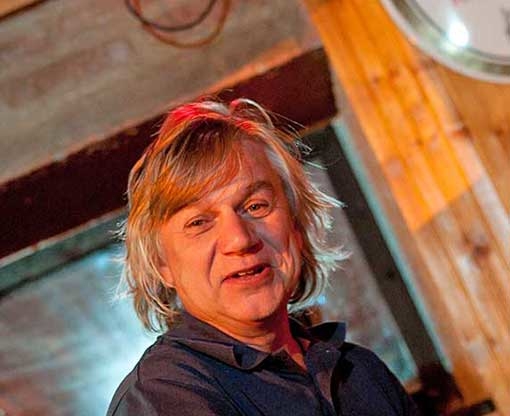Tomáš Kytnar, the manager of the Stará Pekárna club in Brno and bandleader of the group Tady To Máš (a pun containing Kytnar's given name 'Tomáš' but meaning 'Here You Are') has been setting Slovak lyrics to music for years. He based several of his albums on the poetry of contemporary Slovak poets Judita Kaššovicová and Erik Ondrejička. When asked if he deliberately avoided Czech lyrics, he replied in an interview for Brno – City of Music in 2013: "I really am thinking a little about Czech, but I will definitely not look for something in a systematic way or place an advertisement. As Slovak poets actually came to me by themselves, the Czech ones should come by way of chance, shouldn't they?" Seven years have passed. Since then, Kytnar and his band have released the "Slovak" albums Srdiečka tiché (Silent Hearts) and Krajina diamantov (Land of Diamonds), and... this year a change is coming. The novelty Ryba Květovoň (loosely translated as Flowerscent Fish) combines Kytnar's typical composing signature with Czech poetry written by Bogdan Trojak.
Tomáš Kytnar, a rocker in his soul, a bluesman in his heart, a lover of modern poetry, does not make an effort to please listeners at any cost. We will rarely find instant hits on his albums, and the novelty Ryba Květovoň is perhaps one of the least accessible recordings in his discography. This does not mean, however, that his creation is pointlessly complicated. Just as you have to find a relationship with abstract poetry full of unconventional imagery, you also need to 'listen through' the full sound of Kytnar's songs. In fact, both components, lyrics and music, are characterised by the word 'multilayered'. Listening to Ryba Květovoň, one thinks that Trojak and Kytnar had been unconsciously looking for until they eventually found each other. "Kosatkou luny zválená louka. Stříbrnou ploutví škrábnutá zem." ("A meadow rolled by a lunar whale. The ground is scratched by a silver fin.") Or: "Nedávno jsem kdesi četl, že v krvinkách ženy plavou tělíska podobná paličkám na bubení!" ("I recently read somewhere that little corpuscules resembling drumsticks float in a woman's blood cells!") And: "Mráz nese u pasu kleště ze zvonoviny. Měsíc jako psí čelist zavěšená na hřebu. Kouří se od úst a srdce roztlouká muří nožky." ("The frost carries pincers made of bell bronze at its waist. The moon like a dog's jaw hanging on a nail. Smoke comes out from the mouth and the heart crashes chicken legs.") These are verses that hide inner tension within and which directly call for Tomáš's 'rhythmicising' musical style, which is based on a regular rock or blues scheme, while at the same time broadmindedly loosens itself in a jazz-like manner. Along with this horizontal layer, a vertical layer, consisting of harmonic and sonic richness, goes hand in hand; this is both a privilege and a pitfall of Kytnar's songs. On the one hand, we can appreciate the way he manages to combine the piano as a crucial instrument, a distinctive bass line (perhaps more important here than on the previous albums) and melodic lines of wind instruments and vocals, not to mention the accordion or mouth organ. On the surface of the whole album it seems, however, that less would sometimes be more and that it would not be detrimental to make things sound somewhat more "transparent". The imagery from the poems is sometimes lost in that richness of colours and harmonies.
Tady To Máš has always been more of a free association of friends than a regular band. The line-up of the group changes slightly from one album to another, but these changes are interesting especially on a longer time horizon. While the older albums featured a remarkable Slovak component with the singer Juraj Turtev or the guitarist Miloš Železňák, this time Kytnar has surrounded himself mainly with personalities from the Brno music scene, or other befriended Moravian musicians: the guitarist Petr Zavadil, the percussionist Pavel Plch or the mouth organ player Karel Markytán. Some of the saxophones were recorded by the sound master Broněk Šmid (another saxophonist on the album is Jan Kyncl) and the well synchronised rhythm section is extremely important – Kytnar's son Lukáš playing drums and Mojmír Sabolovič on bass guitar, both members of the Band of Heysek group. An interesting feature is the guest appearance of the Belarusian accordionist Aliaksandr Yasinski, who is also well-established on the Czech scene. The singing parts are shared by proven vocalists Tomáš Frgala and Jana Fujaková.
What do we actually hear from the new album by Tomáš Kytnar and his friends? The aforementioned richness (even opulence) of sound of Tady To Máš follows on the prog-rock tradition, looking for a path between rhythmically readable electric blues and freer jazz techniques (in fact, the basic line-up of piano, bass, drums, and sometimes saxophone, also stems from jazz). The lyrics step into this, often recited rather than melodically sung. The result is a collection of songs that hardly anyone will start humming after the first listening. But the more carefully or deeply we immerse ourselves in the album, the more likely it is that some of Trojak's unusual verses or something from Kytnar's art of layering colours and sounds will get stuck in our memory. Ryba Květovoň is really one of the least accessible albums by the Tady To Máš project. But it is certainly worth attentive listening.
Tady To Máš – Ryba Květovoň; published by Tomáš Kytnar 2020. 11 tracks + bonus, total playing time: 51:52
































No comment added yet..